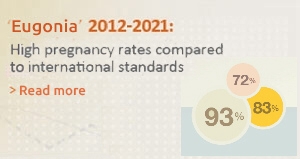Surgical sperm retrieval is recommended in cases of confirmed azoospermia, inability to produce a semen sample on the day of egg collection or failed attempt of electroejaculation. The procedure can be performed on the day of the egg collection under intravenous or local analgesia. The testicular tissue excised is processed by the embryologist in order to retrieve any sperm. Once motile sperm have been isolated, the mature eggs can be fertilized using intracytoplasmic sperm injection (ICSI). Any excess motile sperm can be cryopreserved for future use.
There are various methods or surgical sperm retrieval, either from the epididymis or from the testes.
Sperm retrieval from the epididymis
- Microsurgical epididymal sperm aspiration (MESA):
It is recommended in cases of obstractive azoospermia with normal spermatogenesis. The epididymis is surgically opened with the use of a microscope and fluid is aspirated so that sperm can be retrieved. - Percutaneous epididymal sperm aspiration (PESA):
It is recommended in cases of obstractive azoospermia with normal spermatogenesis. A 19-21G needle is passed into the epididymis and then fluid is gently aspirated, as above.
Sperm retrieval from the testes
- Fine needle aspiration (FNA):
It is recommended in cases of obstractive azoospermia with normal spermatogenesis. A 21G needle is passed through the teste - Testicular sperm aspiration (TESA):
It is recommended in cases of obstractive azoospermia with normal spermatogenesis. - Testicular sperm extraction (TESE):
It is recommended in cases of both obstractive and non-obstractive azoospermia and it includes performing an open biopsy and excising small pieces of testicular tissue.
The sperm aspiration methods from the epididymis (MESA, PESA) or the testes (TESA) are simple, but are usually "blindly" performed and can cause testicular tissue damage such as haematoma, cysts and testicular atrophy. Testicular biopsy (TESE) is recommended by the international scientific literature as a more effective method of sperm retrieval and it is associated with fewer complications. For this reason, in our Unit, the surgical sperm retrieval is performed by testicular biopsy (TESE) by specialized surgeons.
The procedure takes place on the day of egg collection with intravenous or local anaesthesia. The small testicular tissue pieces are processed by the embryologist in order to retrieve any available sperm. Following the retrieval, ICSI can be performed. Any excess sperm can be cryopreserved for future use to avoid performing another biopsy.
Testicular biopsy for diagnostic purposes
Testicular biopsy prior to the day of egg collection is not recommended. Our Unit is in line with this recommendation since according to scientific literature such a biopsy constitutes an extra surgical procedure that causes additional damage to the testicular tissue; besides, successful sperm retrieval on the day of the biopsy for diagnostic purposes cannot guarantee that sperm will also be retrieved on the day of egg collection.
Testicular biopsy for diagnostic purposes and the histological evaluation that follows is mainly performed for the assessment of spermatogenesis. The histological evaluation can also be performed on the testicular pieces that are excised on the day of the egg collection.






























